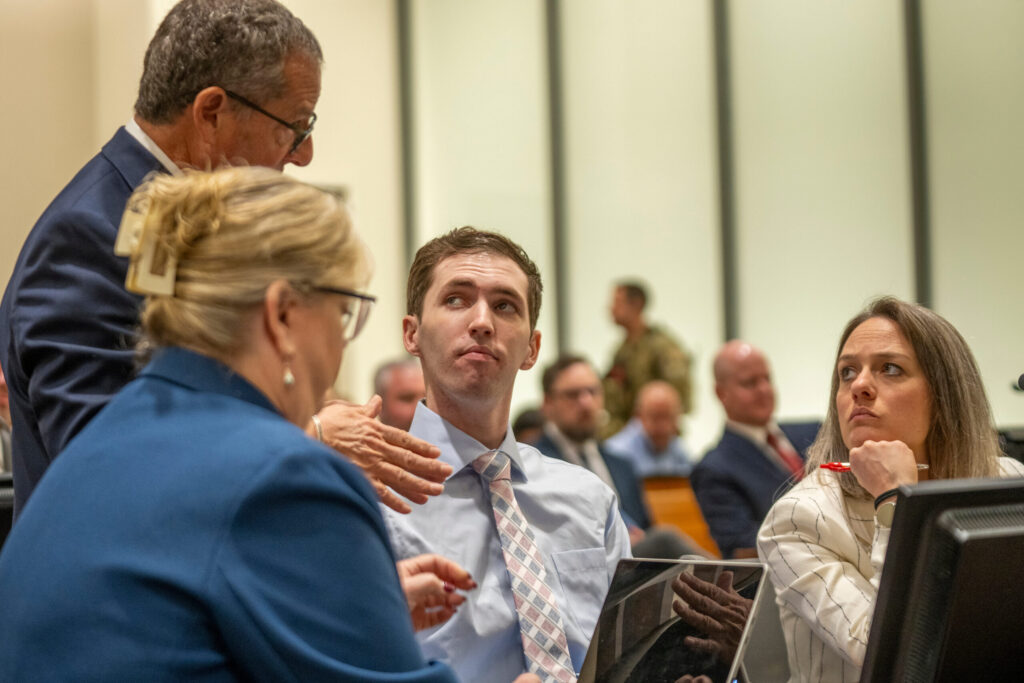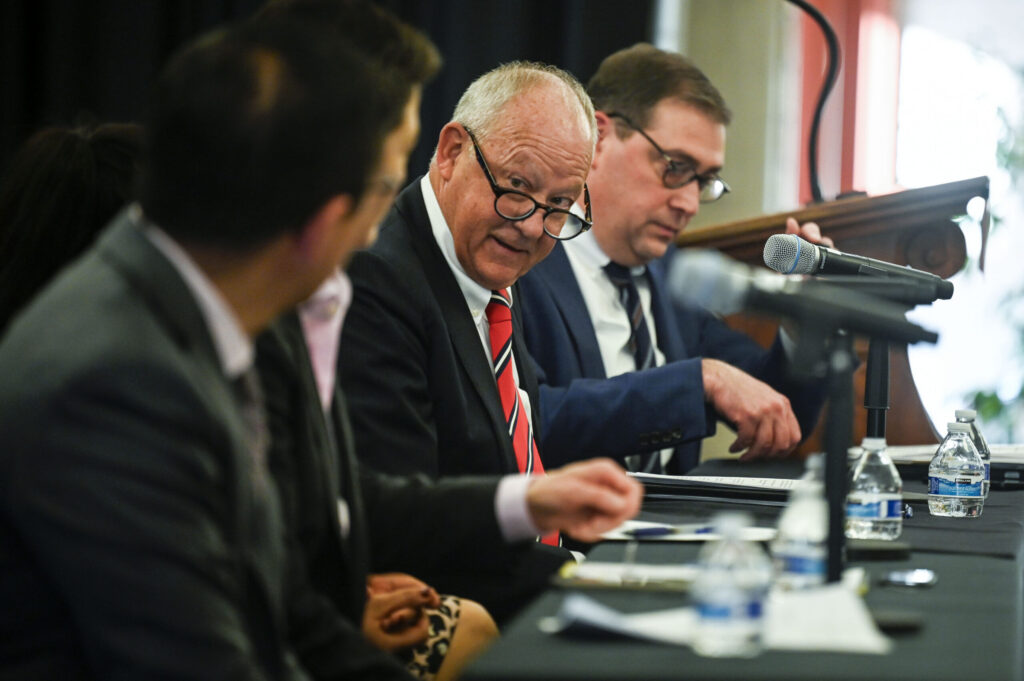OUT WEST ROUNDUP | States could settle longstanding feud over Rio Grande

NEW MEXICO
Feud over beleaguered Rio Grande nears settlement
ALBUQUERQUE – The fight between Texas and New Mexico over the management of one of the longest rivers in North America could be nearing an end as a date to resume the trial has been put off pending negotiations aimed at settling the years-long case before the U.S. Supreme Court.
New Mexico Attorney General Hector Balderas announced on July 5 that a special master appointed by the court cleared the way for ongoing negotiations and set a date in July for a status update.
The Supreme Court would have to approve any agreement reached by the states. In the case of an impasse, the trial would continue later this year.
Texas Attorney General Ken Paxton’s office did not immediately respond to questions about the negotiations or a possible settlement.
The battle over the Rio Grande has become a multimillion-dollar case in a region where water supplies are dwindling due to increased demand along with drought and warmer temperatures brought on by climate change.
The river through stretches of New Mexico marked record low flows again this year, resulting in some farmers voluntarily fallowing fields to help the state meet downstream obligations mandated by water-sharing compacts that date back decades.
Texas has argued that groundwater pumping in southern New Mexico is reducing the river’s flow and cutting into how much water makes it across the border. New Mexico argues that it has been shorted on its share of the river.
A robust start to the monsoon season has given the Rio Grande somewhat of a reprieve after state and federal water managers had warned that stretches of the river closer to Albuquerque would likely go dry this summer as New Mexico’s mega-drought continues.
Large Texas abortion provider will relocate to state
ALBUQUERQUE – One of the largest abortion providers in Texas is planning to move its operations to New Mexico and another provider that offers tele-health services related to abortion and reproductive health care is expanding its footprint in the state.
Austin-based Whole Woman’s Health began winding down its Texas operations after a July 1 ruling by the Texas Supreme Court forced an end to abortions in that state. Now, the provider wants to establish a new clinic in a New Mexico city near the state line to provide first and second trimester abortions.
Home to a Democratic-led legislature and governor, New Mexico recently took an extra step to protect providers and patients from out-of-state prosecutions. It’s likely to continue to experience a steady influx of people seeking abortions from neighboring states with more restrictive abortion laws.
Whole Woman’s Health has started a fundraising effort to help with the costs of moving equipment and supplies from Texas to New Mexico and for the purchase of a building to serve as its new home.
Officials with Mississippi’s only abortion clinic also have plans to relocate to southern New Mexico and the tele-health provider Choix, based in San Francisco, announced Wednesday that it is now licensed to operate in New Mexico and plans to serve all states where abortion care remains legal by the end of 2023.
New Mexico lawmakers last year repealed a dormant 1969 statute that outlawed most abortion procedures as felonies, thus ensuring access to abortion even after the federal court rolled back guarantees.
NAVAJO NATION
Marriage equality once again proposed in tribal bill
FARMINGTON – Months after withdrawing legislation that proposed the Navajo Nation recognize marriage equality through repealing and amending tribal laws, a new bill is bringing back that recommendation.
The legislation seeks to end the ban on same-sex marriage under the Diné Marriage Act and repeal the section of the Navajo Nation Council resolution from 2005 that forbids couples of the same gender from marrying on the tribal land or having their marriage recognized.
Delegate Eugene Tso recently introduced the legislation. It is now eligible for consideration by four standing committees, then the Navajo Nation Council in its summer session.
That session starts July 18, but it is uncertain whether the bill will complete the legislative process by then.
Tso, who represents Chinle Chapter in Arizona and is not seeking reelection this year, said he does not want the matter to be a referendum or be sidelined by delegates through a work session.
“We should understand that we’re changing. We’re no longer back in the ’40s, ’30s or ’20s, we’re going forward. The LGBTQ, they like to enjoy life too,” Tso said.
ARIZONA
Prison sought for official in ballot harvesting case
YUMA – Prosecutors are seeking a one-year prison sentence for a school board member in southern Arizona for illegally collecting four early ballots during the 2020 primary election.
But if probation is imposed instead, prosecutors said the judge should then enforce a provision of Guillermina Fuentes’ plea deal that bars her from holding public office while on probation. Fuentes and another woman, Alma Juarez, were scheduled to be sentenced July 7 on a ballot abuse conviction in Yuma, but the hearing has been postponed until Sept. 1.
Authorities say Fuentes and Juarez participated in “ballot harvesting,” a practice once used by both political parties to boost turnout that was made illegal by a 2016 state law that barred anyone but a family member or caregiver from returning early ballots for another person. It’s the only case filed so far by the state attorney general under the law, which the U.S. Supreme Court upheld last year.
Authorities say Fuentes, a former San Luis mayor, ran a sophisticated operation using her status in Democratic politics in the Arizona border city to persuade voters to let her gather and, in some cases, fill out their ballots. But the crime she admitted in court last month does not involve filling out ballots or any broader efforts.
In a statement, Anne Chapman, an attorney representing Fuentes, said her client had requested a hearing before her sentencing to present mitigating evidence because the request for her to serve a year in prison was clearly excessive.
Fuentes and Juarez each pleaded guilty to a charge of ballot abuse, acknowledging they collected early ballots for people who weren’t family members, didn’t live with them or weren’t receiving care from them.
Fuentes’ conviction is a felony punishable by as little as probation or as much as two years in prison. Juarez’s conviction is a misdemeanor, and under her plea agreement, if she has cooperated as promised she will be sentenced to probation and prosecutors will not seek jail time.
MONTANA
76 million-year-old dinosaur skeleton to be auctioned
NEW YORK – The fossilized skeleton of a T. rex relative that roamed the earth about 76 million years ago will be auctioned in New York this month, Sotheby’s announced July 5.
The Gorgosaurus skeleton will highlight Sotheby’s natural history auction on July 28, the auction house said.
The Gorgosaurus was an apex carnivore that lived in what is now the western United States and Canada during the late Cretaceous Period. It predated its relative the Tyrannosaurus rex by 10 million years.
The specimen being sold was discovered in 2018 in the Judith River Formation near Havre, Montana, Sotheby’s said. It measures nearly 10 feet tall and 22 feet long.
All of the other known Gorgosaurus skeletons are in museum collections, making this one the only specimen available for private ownership, the auction house said.
Sotheby’s presale estimate for the fossil is $5 million to $8 million.














